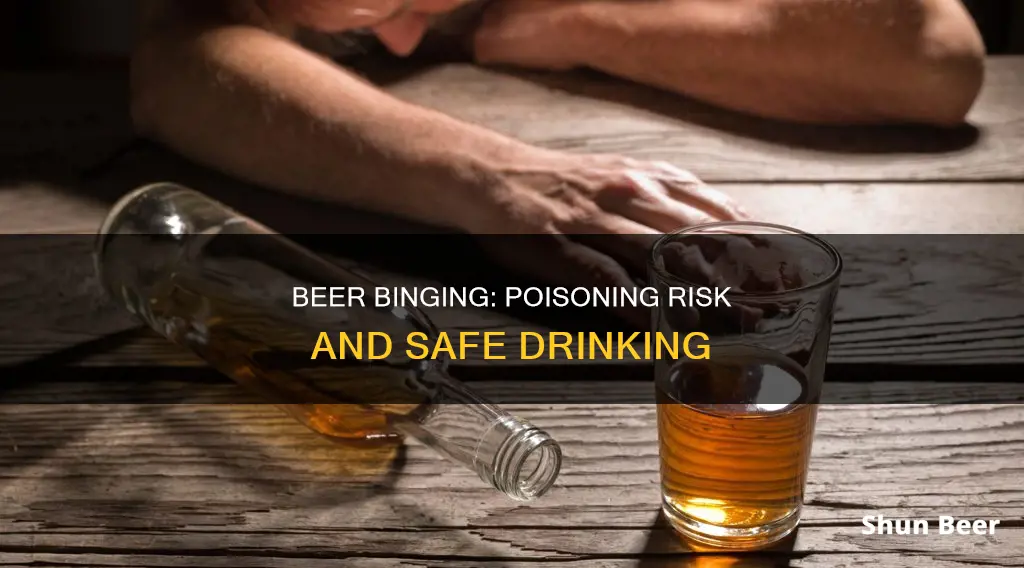
Alcohol poisoning is a dangerous and sometimes fatal condition that occurs when there is so much alcohol in the bloodstream that it starts to affect life-supporting functions like breathing, heart rate, and consciousness. While the amount of alcohol that can lead to poisoning varies from person to person, it is important to understand the risks and signs of alcohol poisoning to prevent serious health complications or even death. This article will explore how much beer one can consume before risking alcohol poisoning and provide crucial information on recognising and responding to this medical emergency.
What You'll Learn

Factors that determine how much beer is too much
It is challenging to determine a precise amount of beer that constitutes "too much," as this can vary depending on several factors unique to each individual. Here are some key factors that influence how much beer is too much:
Weight and Body Composition
The amount of body fat and water in an individual's body can affect how they metabolize alcohol. People with a higher body fat percentage may take longer to process alcohol, leading to a higher risk of alcohol poisoning.
Age
Age plays a significant role in determining alcohol tolerance. Teenagers and young adults are generally more susceptible to alcohol's effects and are at a higher risk of alcohol overdose due to their tendency to engage in binge drinking.
Sex
On average, individuals assigned male at birth (AMAB) have a higher tolerance for alcohol than those assigned female at birth (AFAB). This is partly due to AMAB individuals typically having more body water and less body fat, which affects how alcohol is distributed in the body.
Drinking Speed
The speed at which alcohol is consumed significantly impacts the risk of alcohol poisoning. Binge drinking, or consuming a large amount of alcohol in a short period, can rapidly increase blood alcohol concentration (BAC) and overwhelm the body's ability to process it.
Food Intake
Drinking on an empty stomach increases the risk of alcohol poisoning. Food in the stomach slows down the absorption of alcohol, giving the body more time to process it.
Medication
Combining alcohol with certain medications, such as opioids, sedatives, sleeping pills, or anti-anxiety medications, can increase the risk of alcohol overdose. These substances, along with alcohol, act as central nervous system depressants, enhancing each other's effects.
Individual Differences
It's important to recognize that everyone has different limits when it comes to alcohol consumption. Factors such as sensitivity to alcohol, liver function, and enzyme production can vary from person to person, influencing how their body processes and tolerates alcohol.
While these factors provide some guidelines, it's essential to remember that there is no one-size-fits-all answer to how much beer is too much. The safest approach is always to drink in moderation, stay within recommended limits, and be mindful of your body's limits and overall health.
Ronaldo's Relationship with Beer: A Curious Conundrum
You may want to see also

Signs of alcohol poisoning
It is important to note that there is no definitive answer to the question of how much beer one can drink before alcohol poisoning, as it depends on various factors such as age, weight, sex, body composition, enzyme production, and medications. However, consuming large amounts of alcohol in a short period of time can lead to alcohol poisoning, which is a life-threatening condition.
Now, here are the signs of alcohol poisoning:
Mental Confusion and Changes in Mental State
This may include confusion, trouble speaking, or an altered mood. The person may seem dazed, have slurred speech, or exhibit behaviour that is out of character.
Lack of Coordination and Impaired Motor Skills
Alcohol poisoning can cause difficulty walking, a loss of balance, and reduced muscle coordination. The person may stumble, fall, or have trouble with basic movements.
Difficulty Remaining Conscious
A person experiencing alcohol poisoning may have trouble staying awake or fall into a stupor. They may be difficult to wake up or seem unconscious.
Slow or Irregular Breathing
Breathing may become slow (fewer than eight breaths per minute) or irregular (with ten or more seconds between breaths). This is a critical sign, as it indicates that the alcohol is affecting the brain's ability to control vital functions.
Low Body Temperature
The person's skin may feel cold and clammy, and their body temperature may drop. They may appear pale or ashen, especially if they have darker skin.
Delayed or Absent Gag Reflex
Alcohol poisoning can hinder the gag reflex, which increases the risk of choking on vomit. This is a dangerous complication and requires immediate medical attention.
It is important to seek immediate medical help if you suspect someone is displaying signs of alcohol poisoning. Do not leave them alone, and try to keep them awake and sitting or partially upright. Call emergency services and be prepared to provide information to responders, including the type and amount of alcohol consumed, as well as any other relevant health information.
Drinking Non-Alcoholic Beer in Public: Is It Okay?
You may want to see also

What to do if someone has alcohol poisoning
It's important to note that there is no definitive answer to how much beer one can drink before alcohol poisoning occurs, as it depends on various factors such as age, weight, sex, water composition, enzyme production, and medications. However, it is crucial to understand the signs of alcohol poisoning and know what to do if someone is displaying these symptoms. Here is a guide on what to do if you suspect someone is suffering from alcohol poisoning:
Recognizing Alcohol Poisoning:
- Pale, clammy, or blue-tinged skin (for lighter skin tones); ashen or washed-out appearance for darker skin tones.
- Low body temperature.
- Slow or irregular breathing (fewer than eight breaths per minute or long gaps between breaths).
- Confusion, difficulty speaking, or other changes in mental state.
- Loss of consciousness.
- Seizures or fits.
- Lack of coordination or inability to walk.
- Incontinence (peeing or pooping themselves).
What to Do if You Suspect Alcohol Poisoning:
- Call for Help: If you suspect someone is experiencing alcohol poisoning, call 911 or your local emergency services immediately. Do not wait for symptoms to worsen.
- Stay with the Person: It is important to stay with the person and keep them awake if possible. They may be at risk of choking on their vomit or having breathing difficulties.
- Prevent Choking: If the person is unconscious, place them in the recovery position on their side. This will prevent choking if they vomit.
- Keep Them Warm: Alcohol poisoning can cause low body temperature. Cover the person with a blanket or jacket to keep them warm.
- Provide Water: If the person is conscious and able to swallow, give them small sips of water to keep them hydrated. Do not give water to an unconscious person, as it may cause choking.
- Do Not Induce Vomiting: Do not try to make the person vomit. This could be dangerous, especially if they are unconscious.
- Do Not Give Caffeine: Avoid giving the person coffee or caffeinated drinks, as this can lead to further dehydration.
- Avoid Cold Showers or Baths: Do not put the person in a cold shower or bath. They may lose consciousness or fall, and there is a risk of their body temperature dropping too low.
- Provide Information: When the paramedics arrive, provide them with as much information as possible. This includes details about how much the person drank, what they drank, and any other relevant information.
Is Non-Alcoholic Beer Really Sober Drinking?
You may want to see also

What not to do if someone has alcohol poisoning
Alcohol poisoning is a life-threatening condition that requires immediate medical attention. Here are some things you should not do if someone is displaying signs of alcohol poisoning:
Do not let them drink more alcohol
If someone is showing signs of alcohol poisoning, do not let them drink any more alcohol. Alcohol poisoning occurs when there is so much alcohol in the bloodstream that it starts to affect life-supporting functions like breathing, heart rate, and consciousness. Adding more alcohol to the person's system will only make the situation worse and further endanger their life.
Do not give them coffee or caffeinated drinks
Caffeinated drinks can dehydrate people with alcohol poisoning, so avoid giving them coffee or any other drinks containing caffeine. Instead, if the person is awake, give them water to sip to keep them hydrated. However, do not give anything to drink if they are unconscious, as they may choke.
Do not put them in a cold shower or bath
Do not attempt to sober the person up by putting them in a cold shower or bath. This could cause their body temperature to drop even lower, and they may lose consciousness or fall and injure themselves. Instead, keep them warm with a jacket or blanket, as alcohol poisoning can cause low body temperature.
Do not try to make them vomit
Do not try to induce vomiting in the affected person. If they are unconscious, they could choke on their vomit, which can be fatal. Instead, put them in the recovery position if they have passed out, and make sure they are breathing properly.
Do not leave them alone
Stay with the person and keep them awake. If they are unconscious, stay with them until help arrives. There is a risk that they could choke on their vomit or stop breathing, so it is important to keep a close eye on them and monitor their breathing.
Do not delay seeking medical help
Alcohol poisoning is a medical emergency and can be fatal. Call your local emergency services number or take the person to the nearest emergency room. Do not try to treat alcohol poisoning at home or wait for it to pass. The affected person may need life-saving treatment, so seek medical help as soon as possible.
How Long Does Opened Beer Stay Fresh?
You may want to see also

Preventing alcohol poisoning
Alcohol poisoning is a life-threatening condition that occurs when there is too much alcohol in your bloodstream, causing your brain to shut down. It can affect your breathing, heart rate, consciousness, and body temperature. To prevent alcohol poisoning, it is important to follow these guidelines:
Pace and Space
Sip your drink instead of chugging it. It is recommended to have no more than one drink per hour and to alternate with non-alcoholic beverages. On average, it takes almost three hours for most people to eliminate the alcohol from two standard drinks.
Eat Before and While Drinking
Consuming food, especially protein, helps slow down the absorption of alcohol into the bloodstream. It is recommended to eat before and while drinking to prevent alcohol poisoning.
Avoid Mixing Alcohol with Other Drugs
Some prescription and over-the-counter drugs, such as antihistamines and sedatives, can increase the effects of alcohol. Caffeine and stimulants, such as energy drinks, can make you feel less impaired than you actually are. Mixing alcohol with other substances can be dangerous and increase the risk of alcohol poisoning.
Use Caution When Sick or Tired
When you are sleep-deprived or ill, alcohol leaves your body more slowly. This can lead to a higher risk of alcohol poisoning.
Avoid "Mega" Drinks
Drinks such as Long Island Iced Tea, AMF, Margaritas, or Kamikazes contain five or more times the amount of alcohol in a standard drink. It is important to be aware of the alcohol content in your drink and to avoid excessive consumption.
Set Your Limit Before You Start
Consider your activities for the next day and the impact that alcohol consumption may have on your ability to perform them. Extreme alcohol consumption can affect your critical thinking and performance. It is important to set a limit before you start drinking and stick to it.
Use a Designated Driver
Agree on a designated driver before going out. This person should abstain from drinking to ensure the safety of the group.
Avoid Drinking Games
Drinking games promote rapid ingestion of alcohol and can lead to severe intoxication and blackouts. It is difficult to stick to your personal limits while participating in drinking games.
Zero Drinks in Certain Situations
For individuals under the legal drinking age, it is important to refrain from consuming alcohol altogether. Additionally, if you are driving, pregnant, or taking certain medications, abstaining from alcohol is the safest choice.
Remember, the only thing that can sober a person up is time. Deliberate decisions about alcohol consumption are key to reducing the risk of alcohol poisoning. If you or someone you know exhibits signs of alcohol poisoning, such as confusion, slow breathing, or unconsciousness, call emergency services immediately.
Monks' Beer Consumption: Fasting Exception or Indulgence?
You may want to see also
Frequently asked questions
Alcohol poisoning occurs when there is so much alcohol in the bloodstream that areas of the brain controlling basic life-support functions, such as breathing, heart rate, and temperature control, begin to shut down. This can be caused by drinking large amounts of alcohol in a short period of time, also known as binge drinking.
There is no definitive answer as it depends on various factors, including age, weight, sex, how quickly one is drinking, food intake, general health, and medication usage. Generally, a blood alcohol concentration (BAC) of 0.40% or higher is considered dangerous and can lead to a risk of coma or death.
Signs of alcohol poisoning include mental confusion, difficulty remaining conscious, slowed or irregular breathing, clammy or pale skin, low body temperature, vomiting, seizures, and a lack of coordination. If you suspect someone is experiencing alcohol poisoning, it is important to seek immediate medical help.
To prevent alcohol poisoning, it is important to drink in moderation and avoid binge drinking. Space out your drinks, drink water, and ensure you have eaten before consuming alcohol. Avoid drinking games and mixing alcohol with medications or other substances.







